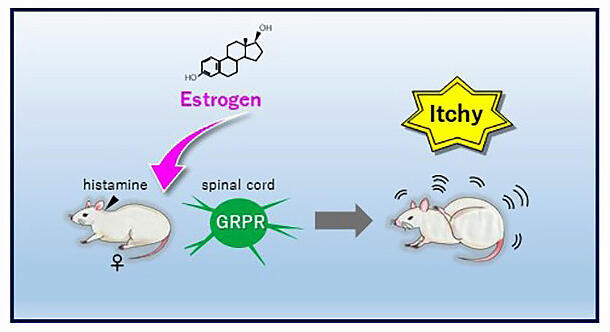The susceptibility of women to "itchiness" changes during periods of fluctuating hormones, such as during pregnancy and menopause; however, the underlying mechanism is not well understood. Keiko Takanami, Assistant Professor at the National Institute of Genetics, and an international team of researchers at Okayama University, Kyoto Prefectural University of Medicine, Toyama University, Bukkyo University, and the University of California, Davis, have clarified the underlying mechanism related to changes in the feeling of itchiness in experiments with rats. The female hormone estrogen regulated scratching behavior by activating gastrin-releasing peptide (GRP) receptor nerves in the spinal cord. This finding is expected to contribute to clarification of the cause of pruritic diseases in women and the development of therapies. This research was published in PNAS.
It has been reported that about 20% women have symptoms of itchiness during pregnancy and that severe itchiness in gestational pruritus dermatitis causes insomnia and stress. However, the cause of the change in the sensation of pruritus, or itchiness, was unknown. The research group suspected that female hormones might alter susceptibility to itchiness and investigated the effects of the major female hormones estrogen and progesterone on itchiness in rats.
Estrogen and progesterone are produced in the ovaries. To test their hypothesis, the researchers divided female rats into four groups as follows: control group where ovaries of female rats were removed and the levels of estrogen and progesterone were reduced; estrogen group where estrogen was supplemented after ovariectomy; progesterone group that was supplemented with progesterone after ovariectomy; and estrogen and progesterone group that was supplemented with both estrogen and progesterone.
After administration of histamine, an itch mediator in humans, to the skin of the rats, the scratching behavior of the hind legs was analyzed as it is an indicator of itchiness. The results showed that scratching behavior increased and continued in the estrogen-supplemented group but not in the other groups, including the progesterone-supplemented group.
As it was recently reported that GRP receptors expressed in the spinal cord uniquely transmit itch to the brain separately from pain, the researchers investigated the effects of estrogen on GRP receptors. They found that the activity of GRP receptor nerves was elevated in the estrogen group as compared with that in the control group after having received the itch stimulus. In addition, it was found that the increased itchiness caused by estrogen was transmitted via the GRP receptor in the spinal cord because the scratching behavior aggravated by estrogen was alleviated by the suppressive action of the GRP receptor.
In the estrogen group, in vivo electrophysiological analysis revealed an itchiness stimulation-mediated increase in the activity of GRP receptor nerves in the spinal cord. In addition, it was also indicated that estrogen mediated an increase in the abundance and activity of the GRP receptor. From these results, it became clear for the first time that the female hormone estrogen increases the itchiness caused by histamine by promoting the activity of GRP receptor nerves in the spinal cord. While estrogen increased the itchy sensation, the feeling of tactile sensation decreased and pain levels did not change. This has revealed that estrogen has different effects on itchiness, pain, and tactile sensation.

Credit: National Institute of Genetics
The result is expected to serve as a starting point for sex-specific healthcare. Assistant Professor Takanami said. "During this research, I experienced pregnancy and childbirth and I experienced a strong and unpleasant itch during the pregnancy period. As observed in human women, female animals also have a sexual cycle. Previous studies have been mainly performed in male animals due to issues involving gene expression and behavior often fluctuating in response to fluctuations in female hormones. There are many female- and male-specific illnesses that may exert varying effects. Given the different effects of drugs on men and women, further research and understanding of sexual differences in medicine is needed. This study clarifies the causes of itchiness in women. I hope that this will be a new starting point for the development of sex-specific medicine."
This article has been translated by JST with permission from The Science News Ltd.(https://sci-news.co.jp/). Unauthorized reproduction of the article and photographs is prohibited.




